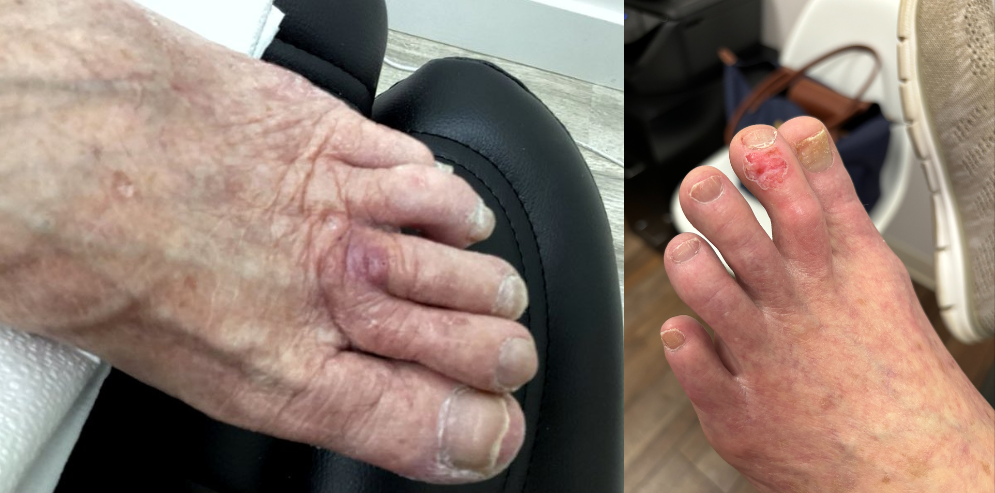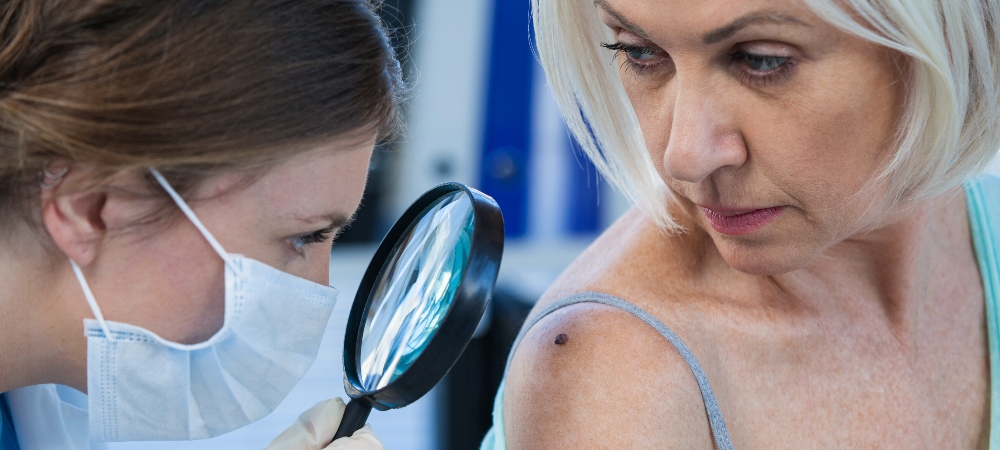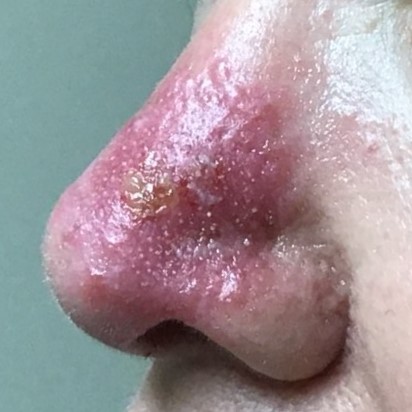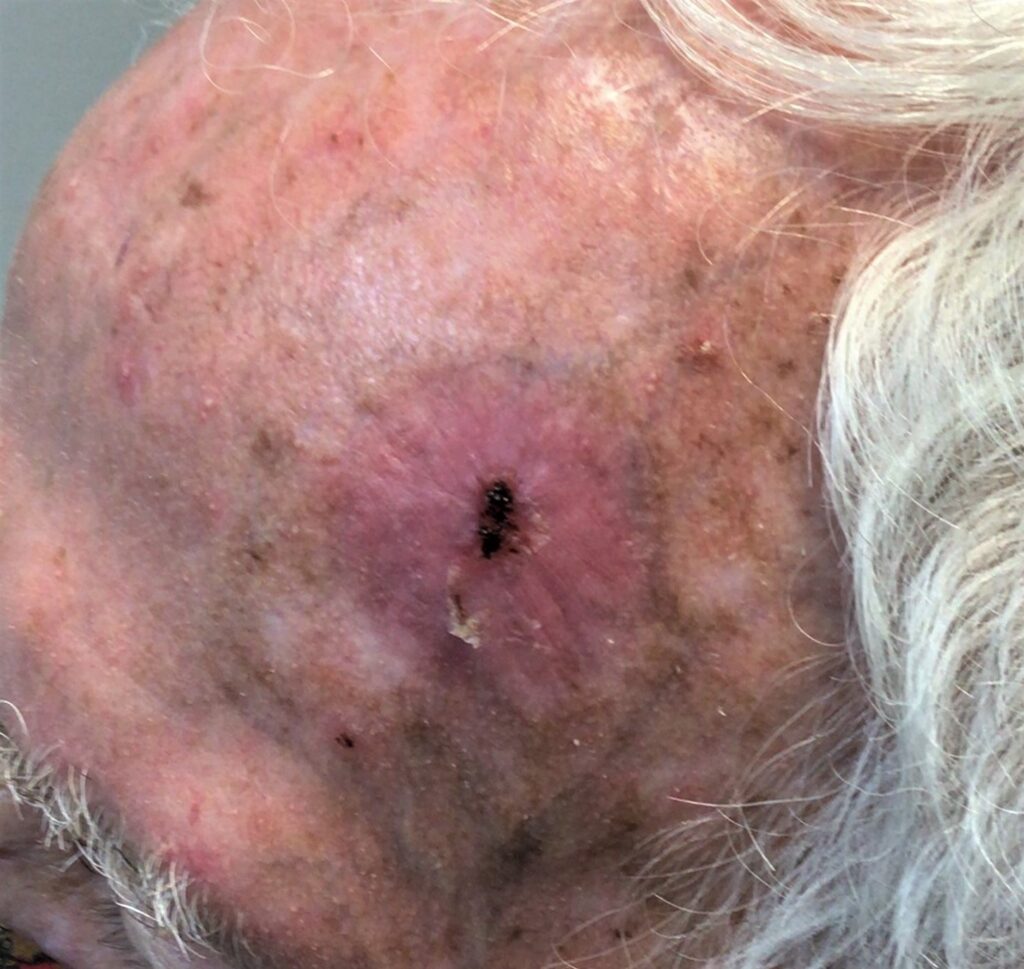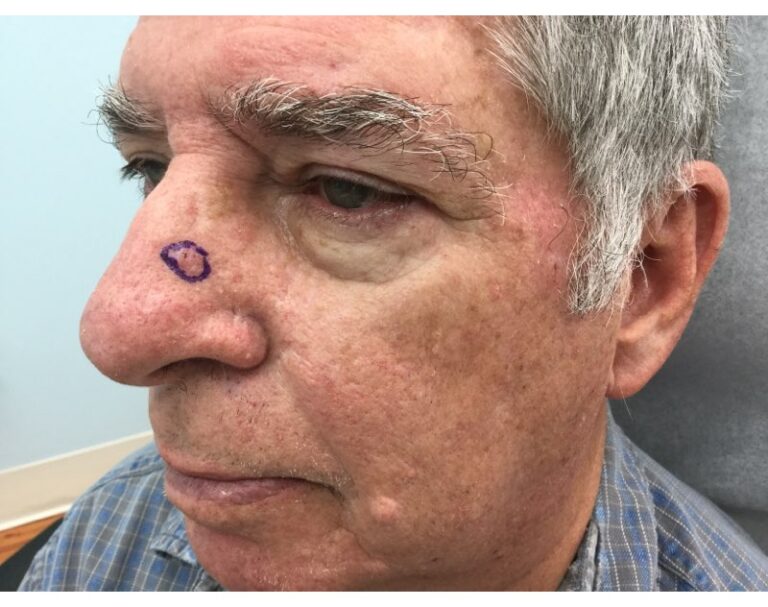
Skin cancer treatment is ever-expanding. Treatments like targeted therapy, immunotherapies, surgery, and surgery-free Image-Guided SRT (for common skin cancers) have proven to be effective methods. However, the work isn’t done — there’s still more for researchers to explore and test in an effort to make skin cancer treatment methods even more successful. Keep reading to learn more about some current points of interest in today’s melanoma research and basal cell and squamous cell research.
Current Treatment for Basal Cell and Squamous Cell Skin Cancers & Research
Basal cell and squamous cell skin cancers are the most common cancers in the United States.
In fact, it’s estimated that about 5.4 million basal cell and squamous cell skin cancers are diagnosed in the U.S. each year. Fortunately, these types of cancers are seldom fatal and don’t usually spread to other organs. Still, many people are diagnosed with advanced basal cell or squamous cell skin cancer.
Breakthroughs in targeted therapies and immunotherapies have revolutionized the way basal cell and squamous cell skin cancers are treated. While the exact number of people who die from basal cell and squamous cell skin cancers each year is unknown, it’s estimated to be around 2,000 and dropping. Research is ongoing, and is currently focused on expanding treatments that have been effective, such as targeted drugs and FDA-approved immune checkpoint inhibitors.
Targeted Drugs
Targeted therapies use drugs or other substances to directly target cancer cells while leaving normal cells alone. Targeted drugs sonidegib (Odomzo) and vismodegib (Erivedge) can be used long-term to regulate the skin cancer areas in people with basal cell skin cancer. As is true for many types of drugs, though, resistance can develop and both medications have side effects that often cause people to stop using them. Right now, researchers are searching for ways to offset the development of drug resistance and reduce the severity of the side effects of these medications.
FDA-Approved Immune Checkpoint Inhibitors
One of the main jobs of the body’s immune system is to differentiate between normal cells and “foreign” cells, such as cancer cells. The immune system can then attack foreign cells while leaving healthy cells untouched. How does the immune system differentiate? It relies on “checkpoint” proteins to turn it on and other checkpoint proteins to turn it off. Some cancer cells create high levels of a protein that can switch off the white blood cells (T cells) that fight foreign cells. Monoclonal antibodies, or immune checkpoint inhibitors, can be used to help the immune system find and attack cancer cells.
There are a few FDA-approved immune checkpoint inhibitors available for some people with advanced or metastatic basal cell or squamous cell skin cancers:
- Cemiplimab (Libtayo) for some people with metastatic or locally advanced squamous cell skin cancer
- Pembrolizumab for some people with recurrent or metastatic squamous cell skin cancer
- Cemiplimab for some people with advanced basal cell skin cancer that isn’t responsive to targeted therapy
What’s New?
Clinical trials are testing other immunotherapy drugs, as well as different drug combinations, for basal cell and squamous cell skin cancer treatment. One study is currently testing a new form of targeted therapy in conjunction with cemiplimab or pembrolizumab for people with advanced or metastatic squamous cell skin cancer or Merkel cell skin cancer, which is a rare and aggressive form of skin cancer.
Image-Guided SRT: Surgery-Free Common Skin Cancer Treatment
GentleCure™ utilizes Image-Guided SRT (Image-Guided Superficial Radiotherapy) to treat common skin cancers, such as basal and squamous cell skin cancers.
It’s the first and only form of skin cancer treatment that utilizes ultrasound images. These images allow your dermatologist to see the size of the skin cancer area at every stage of treatment, so it can be targeted effectively. Over time, Image-Guided SRT kills skin cancer cells with low levels of X-ray energy, which is administered during 3-5 treatments per week for several weeks.
Image-Guided SRT is a leading-edge radiotherapy technology because it’s an effective, surgery-free method that won’t limit your daily activities. No antibiotics are required post-treatment and people being treated with Image-Guided SRT can continue using their regularly prescribed medications with no interruptions.
The current state-of-the-art equipment used for treating nonmelanoma skin cancer is the Sensus SRT-100 Vision™. The FDA has cleared this device for the treatment of nonmelanoma skin cancer.
Current Treatments for Melanoma & Melanoma Research
For early-stage melanoma, surgery is the standard treatment. Surgery can also be a crucial part of treatment for people with advanced melanoma. Adjuvant therapy is an additional cancer treatment that’s given to people with melanoma after surgery. Nivolumab, ipilimumab, and pembrolizumab are all approved adjuvant therapies for melanoma that has spread to the lymph nodes, but can still be removed with surgery.
Currently, researchers are focusing on finding treatment methods that target specific mutations in melanoma cells or use the body’s immune system to directly target melanoma cells. Melanoma-targeted therapies and immunotherapies have made melanoma treatments more effective for people with skin cancer, but researchers are continuing to search for newer and better solutions.
Researchers are also exploring advances in treatment methods for rare melanoma types, such as intraocular (uveal) melanoma, desmoplastic melanoma, and mucosal melanoma. In recent clinical trials, results have suggested that these rare melanoma types may be treatable with immunotherapies. For example, Immunotherapy known as bispecific fusion protein has shown positive results when it comes to treating intraocular melanoma, which is only minimally affected by immune checkpoint inhibitors.
Learn More About Surgery-Free Skin Cancer Treatments from GentleCure
If you’ve been diagnosed with a common type of skin cancer, such as basal cell or squamous cell skin cancer, we encourage you to explore the possibility of getting Image-Guided Superficial Radiotherapy (Image-Guided SRT). Contact us online or by phone to speak with our skin cancer information specialists about this surgery-free treatment method.
